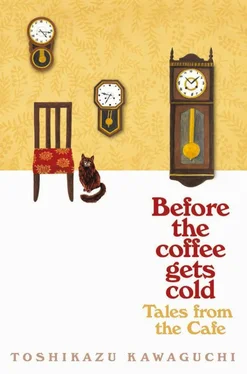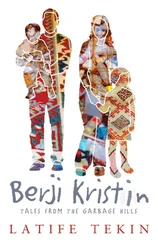The entire cafe appears to be glowing.
Yukio was beset by a mysterious feeling. The lighting hadn’t got any brighter. Yet everything now looked fresh to his eyes. His despair at life had metamorphosed into hope. His outlook had changed unrecognizably.
The world hasn’t changed, I have…
Staring at the woman in the dress, he mused over what he had just experienced. Kazu cleaned away his cup and served a new coffee to the woman in the dress.
‘Kazu…’ he called out towards Kazu’s back, ‘Mum said to say thanks.’
‘Oh, did she?’
‘Yeah, and I should thank you too…’
Upon saying this, he bowed his head very deeply. Kazu walked off into the kitchen to wash up the cup that he had used. When she was out of sight, he slowly took out his handkerchief to wipe his tear-soaked face and blow his nose.
‘How much is it?’ he called to Kazu. She promptly came out and started reading the bill out loud at the cash register.
‘One coffee plus the after-hours surcharge. That comes to four hundred and twenty yen, please,’ she replied, pressing the heavy keys of the cash register, her deadpan expression not faltering. The woman in the dress continued reading her novel as if nothing had happened.
‘All right then… here you are.’
He passed her a thousand-yen note.
‘Why didn’t you tell me about the alarm?’ he asked.
Kazu took his money, and once again pressed the clunky keys.
‘Oh, I’m sorry, I must have forgotten to explain that to you,’ she replied with a cool expression, bowing her head a little. Yukio smiled, looking genuinely happy.
Lin-lin lin-lin li – n-lin…
The chirping of a bell cricket could be heard coming from somewhere.
As if egged on by the chirping, Yukio began speaking as Kazu placed the change into his palm. ‘Kazu… Mum said she hopes you find happiness too,’ he said, and promptly left the cafe.
They weren’t the words that he had heard from Kinuyo. But considering Kazu’s circumstances, he could easily imagine her saying such a thing.
CLANG-DONG
With Yukio gone, Kazu and the woman in the dress were alone. The doorbell was still softly humming. Kazu took a cloth and began to wipe the counter top.
‘Chirping throughout the long autumn night.
Oh, what fun to hear this insect symphony!’
Kazu sang to herself softly. As if in response, lin-lin li – n-lin , chirped the bell cricket.
The quiet autumn night wore slowly on…
A man from the past was sitting in that chair .
Not only could you go back in time in this cafe, you could also visit the future. Compared with the number of people who choose to return to the past, however, hardly anyone chooses to venture into the future. Why? Well, whereas you can return to the past and aim to coincide with the person you want to meet, this is simply not possible when heading to the future. The prospects of meeting a particular person at the cafe at a specific time in the future are riddled with uncertainty.
For example, even if you set a date, all kinds of things could happen to hinder that person’s journey to the cafe that day. Their train might simply be delayed. There might be an urgent request from work; a road might be closed; a typhoon might hit; the person might be ill – the point is, no one knows what obstacles are waiting. The chances, therefore, of a person travelling to the future and successfully meeting the right person are extremely low.
Yet, there in the cafe, was a man who had come from the past. His name was Katsuki Kurata. He was in knee-length shorts and a T-shirt with beach sandals on his feet. The cafe, in contrast, was decorated with an artificial Christmas tree that reached nearly to the ceiling. It took pride of place in the centre of the room; the middle table had been moved in order to make room for it in this tiny nine-customer cafe. The tree had been bought by Nagare Tokita’s wife, Kei, before she died, as a sign of her affection for her beloved daughter Miki (she wanted to leave behind something that could be decorated every year).
Today was 25 December, Christmas Day.
‘You’re not cold, dressed like that?’ asked Kyoko Kijima, who was sitting alongside Miki at the counter. She was half concerned, half amused at how unsuitable Kurata’s attire was for Christmastime.
‘How about a blanket or something?’ suggested Nagare, popping his head out of the kitchen, but Kurata replied, with a quick wave of his hand, ‘I’m fine. I don’t feel cold at all. But could I have glass of cold water please?’
‘OK, one cold water coming up,’ said Kazu Tokita behind the counter. As she spoke, she spun round, pulled a glass from the shelf, filled it with water and walked briskly over to Kurata.
‘Thank you,’ he said, taking the water from her, and drinking it down all in one go.
‘I’ve finished!’ exclaimed a gleeful Miki, gripping a pen. Sitting at the counter next to Kyoko, she had just finished writing a wish on a vertically-folded piece of paper known as tanzaku .
As Miki held up the paper, Kyoko asked, ‘What did you wish for this time?’ while trying to peek.
‘I wish that Daddy’s feet would start smelling nice,’ Miki read out energetically. Finding that terribly amusing, Kyoko blew a short raspberry. Giggling also, Miki dropped down from the seat, and walked over to hang her tanzaku wish with the other decorations on the Christmas tree. It was an unusual time to be writing tanzaku – something people would normally do on the seventh of July when the Tanabata Festival is held. The tree was already festooned with several such wishes she had written, and their contents varied. Nagare was by far the most common theme among them. Aside from ‘smelly feet’, she wished that he would ‘become shorter’ and that he would ‘stop being so cranky’. Kyoko often had to suppress her laughter.
Writing wishes on tanzaku and hanging them on the Christmas tree was not a regular activity at the cafe. On seeing Miki practising her writing, Kyoko had suggested, ‘Why not write wishes and decorate the tree with them?’
Kazu, who normally didn’t laugh that much, was chuckling too. The cheerful atmosphere even made Kurata, the man from the past, smile.
‘Stop just writing silly things,’ an exasperated Nagare grumbled as he came out from the kitchen holding a square twenty-centimetre box. The box held the Christmas cake, made by him, that Kyoko had ordered.
Miki looked at him and giggled, then turned to the tanzaku hanging from the tree, clapped her hands and prayed in the traditional Shinto way. Was it Christmas, or the Tanabata Festival, or was she pretending to visit a shrine? It was all very confused.
‘Right, next one…’ said Miki, far from finished, as she began to write once more.
‘Oh, not again…’ Nagare sighed.
After putting the cake box in a paper carrier bag, he said, ‘This is for Kinuyo…’ and added a takeaway coffee in a smaller paper bag.
‘Huh?’ Kyoko started. Her mother Kinuyo, who died that year in the last days of summer, had always enjoyed drinking Nagare’s coffee – she had gone on drinking it every day while in the hospital too.
‘Thank you,’ Kyoko said softly, tears in her eyes. She was moved by his thoughtful kindness in adding the coffee that Kinuyo had loved, even though she never ordered it.
Bereavement.
It’s a part of life, and carrying out acts of mourning allows us not to forget. Perhaps in the case of the large Christmas tree that Kei had left, the tree embodied not only her wish to never be forgotten but was also a sign that she would always be watching over them. As for the way the Christmas tree was used, well, it was unconventional. But if Miki enjoyed it, it was certainly being used in accordance with Kei’s wish.
Читать дальше












